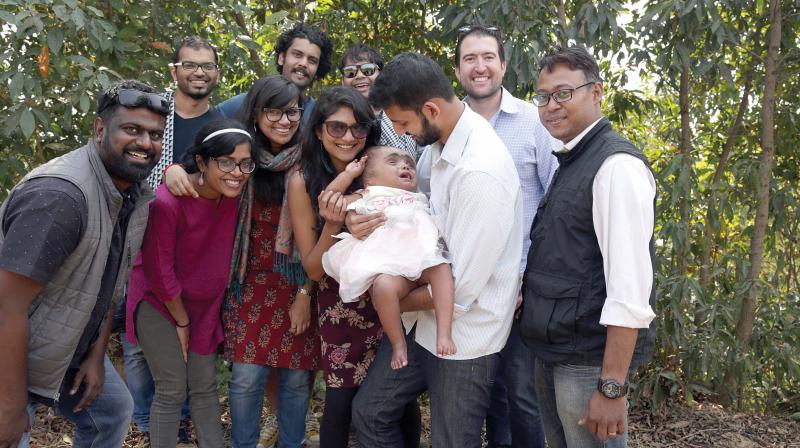WIF' of hope for little ones
A Bengaluru girl's film has won a grant by the LA-based Women in Film (WIF) Finishing Fund.

Rooting for Roona, directed by Pavitra Chalam, a 36- year-old Bengalurean will be the first film out of India that focuses on the neglected story of birth defects, the magnitude of its hidden toll and the fight for the health of the Indian child. The film has won the Los Angeles-based Women in Film Finishing Fund $25,000 grant to enable the team to complete the film. Infact, co-director, Akshay Shankar, and Pavitra will be flown to the Sundance Film Festival at Salt Lake City this weekend to receive the grant.
Out of every 100 babies born in India annually, six to seven have a birth defect. In India alone, this translates to 1.7 million birth defects annually and accounts for 9.6 per cent of all newborn deaths. Focusing on the much neglected problem, Rooting for Roona is based on the true story of a child who was born with an oversized head.
The nine recipients of the 33rd annual Film Finishing Fund were selected from 390 feature length narratives, short films and documentaries submitted from 22 countries. Pavitra is the sole Indian director to win the grant and the team of Curley Street Media beams with pride.
The mother of a seven-month-old and recipient of several awards shares her story.
“Rooting for Roona is the story of a little girl named Roona Begum. Roona was born in November 2011 with a birth defect that caused her head to swell to a size the world had never seen. Her parents, Abdul and Fatema, were told by local hospitals that nothing could be done. They took her home and waited for the inevitable. Then one day a photograph of Roona went viral and triggered an amazing chain of events. A swell of support from around the world resulted in a private hospital agreeing to treat Roona. She was flown to Delhi and her treatment began. Our film follows her journey of recovery over the course of five years,” Chalam elaborates.
Rooting for Roona is the story of two tenacious heroes — an extraordinary girl and her indomitable mother. Overwhelmed by the recognition and grant, Chalam says, “This grant is a tremendous validation of our commitment to a cause that we believe demands the world’s attention — child and maternal health. This film is a labour of love that has taken six years with unwavering support of our friends and family.”
She was awarded the Asia-Pacific Award for Outstanding Documentary Talent at the DocWeek Film Festival in Adelaide for Indelible in 2014, and honoured by the government of India as one of 25 women achievers/ambassadors for social change. Pavitra has also received the Ability Media International Award in London 2010 for Khushboo, a film about children with complex needs.
Having founded Curly Street Media in 2012, she recalls the beginning of her journey, “I fell in love with the medium of film when I represented India as a Peace Ambassador to Pakistan in 2003 to attend the Youth Initiative for Peace conference. At the end of the conference we decided to document our statement of peace between both countries through film. It was at that moment when I fully and viscerally grasped the importance of telling stories through the unforgiving and powerful lens of a camera. It was in 2012 that the foundation stone of Curley Street was set with a diverse, opinionated group of young souls whose primary qualification was to possess a madness to bring the small, yet important, narratives of the country to the mainstream. We choose to tell human stories about under represented issues like complex needs, sex trafficking, drugs, oppression, environment, education and health.”
The Frank Anthony student’s journey into films started in 2003. Her films have since, received critical acclaim across the world, and she followed up these experiences with a formal film-making degree at the New York Film Academy.
She was a national level roller skater and athlete, and graduated from Mount Carmel College. “My husband Dr Rishi Thussu and I had a baby boy on the June 23, 2018. In the past seven months, my life has revolved around him and completing Rooting for Roona. Being obsessed and heavily invested in my friendships and relationships made me a story-teller,” she concludes.

